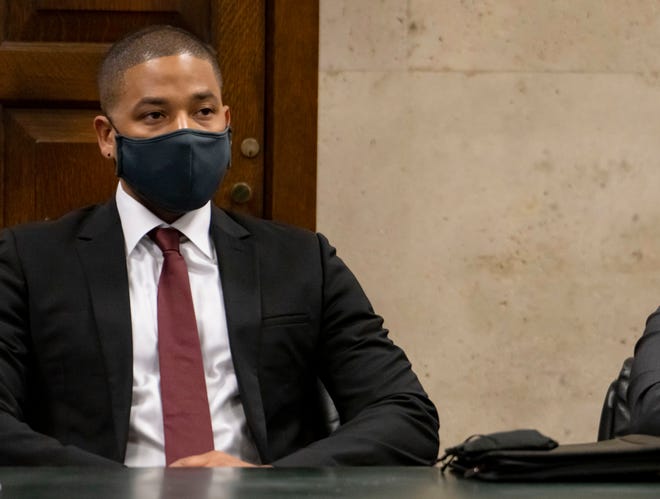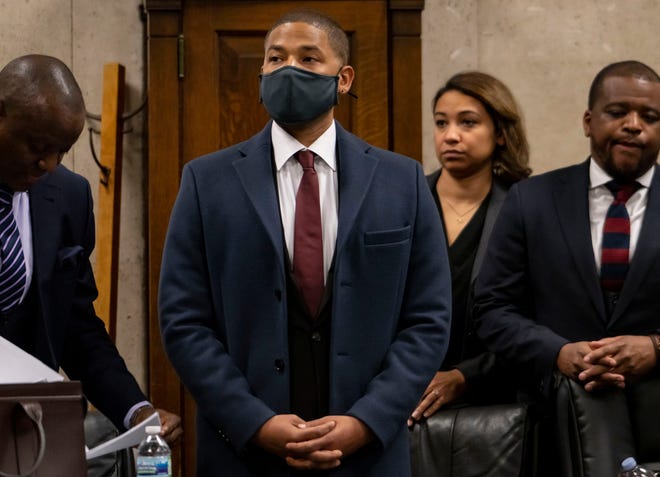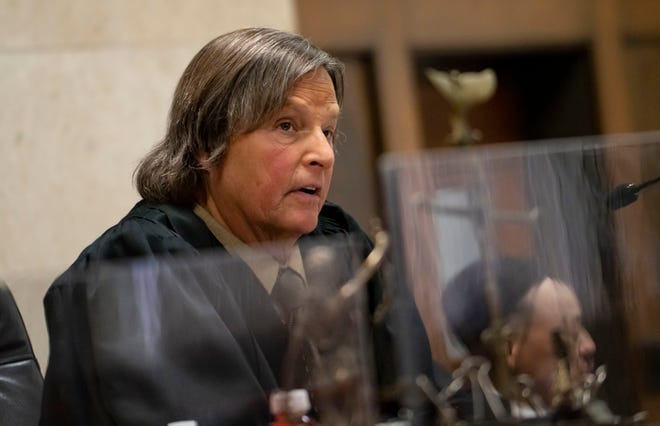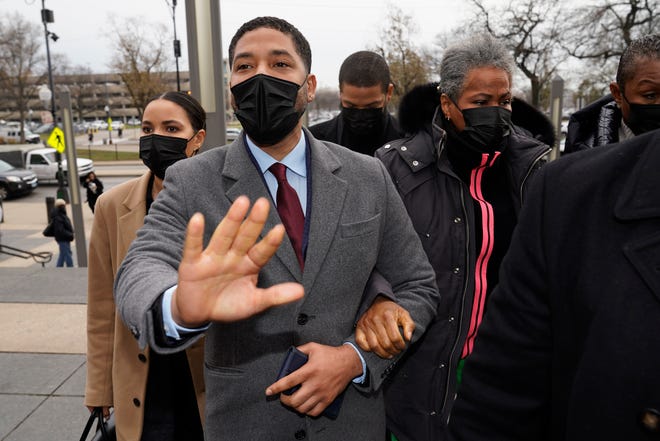
This article is more than
3 year oldJussie Smollett, the former “Empire” star found guilty of staging a racist and homophobic attack, was sentenced Thursday to 150 days in county jail.
Cook County Judge James Linn also sentenced Smollett to 30 months of felony probation and ordered the actor to pay restitution of $120,106 and a $25,000 fine. Linn denied a request to suspend Smollett's sentence and ordered he be placed in custody immediately.
Following the verdict, after previously declining to speak Thursday, Smollett stood and said to the judge: "I am innocent, and I am not suicidal," he added, suggesting that "if anything happens" in jail, he did not take his own life.
"If I did this then it means I stuck my fist in the fears of Black Americans in this country for over 400 years and the fears of the LGBTQ community," Smollett also said. "Your honor, I respect you and I respect the jury, but I did not do this."
As he was being led out of the courtroom, Smollett added: "I could have said that I was guilty a long time ago."
Jussie Smollett sentencing: A breakdown of charges actor faced at trial
Smollett timeline: A look back at the ex-'Empire' star's alleged attack, hoax claims

Before reading Smollett's sentence, Judge Linn addressed post-trial motions presented by the defense. Defense attorney Tina Glandian argued for a retrial of Smollett's case, citing a number of errors during the actor's trial, including disregard of a previous “immunity agreement” between Smollett and the Cook County state attorney's office, improper burden shifting and a lack of scrutiny of witness testimony.
The prosecution, led by Sean Wieber, said the defense's assertion of trial errors was riddled “with distortions of the actual record” and that the evidence presented during trial “overwhelmingly” demonstrated Smollett’s involvement in the staged attack.
Despite Glandian’s extensive argument, Linn ultimately denied the request for retrial, saying he stood “by my findings and rulings.”
“I do believe at the end of the day that Mr. Smollett received a fair trial,” Linn said. “There was nothing unconstitutional about these proceedings, and this motion for post-trial relief is respectfully denied.”
Witnesses for both the state and Smollett testified at Thursday's sentencing, including Molly Smollett, Smollett’s 92-year-old grandmother. She called her grandson a “justice warrior” and asked Linn not to include prison time in his sentence. “I ask you, judge, not to send him to prison,” Molly told the court. “If you do, send me along with him, OK?”

Chicago Police Supt. David Brown, who was called by the state, submitted a statement that was read aloud by Samuel Mendenhall, a member of the special prosecution team. Brown, who wasn’t with the city at the time of Smollett’s police report, said Smollett’s false report of a hate crime harmed “actual victims” of such crimes. Brown also asked that the city be compensated for its costs.
Special prosecutor Dan Webb asked Linn to include “an appropriate amount of prison time” when sentencing Smollett. He also asked Smollett be ordered to pay $130,000 in restitution to the city of Chicago.
Smollett’s defense attorney Nenye Uche asked Linn to limit the sentence to community service. He said Smollett “has lost nearly everything” in his career and finances and asked that Linn give him time to make restitution if that is part of the sentence. “Why are we jumping up and down as if this is a murder case?” Uche said. “It’s not.”

Smollett, 39, was found guilty on five counts of disorderly conduct in December 2021 – one count for each separate time he was charged with lying to police in the days immediately after the alleged attack, which Smollett reported in January 2019. He was acquitted on a sixth count, of lying to a detective in February 2019, weeks after Smollett said he was attacked.
Disorderly conduct is a class 4 felony that carries a sentence of up to three years in prison, but experts had predicted Smollett would likely be placed on probation and perhaps ordered to perform community service.
The actor's week-long trial began on Nov. 29, 2021, nearly three years after Smollett, who is Black and gay, told police someone put a noose around his neck and yelled racist and homophobic slurs. According to police, he also told detectivesthe attackers yelled, “This is MAGA country!” before fleeing the scene.
Smollett was originally indicted on 16 counts of disorderly conduct by a Cook County grand jury in March 2019, to which the actor pleaded not guilty. His attorneys said the charges were dropped later that month.
However, in April 2019, Smollett was hit with a double whammy of lawsuits. The city of Chicago filed a lawsuit seeking to recoup the investigation costs, totaling $130,000. The second lawsuit was a defamation suit filed against Smollett's attorneys by brothers Abimbola and Olabinjo Osundairo, who said they helped Smollett stage the attack.
Webb was named as special prosecutor in August 2019 to investigate why the charges against Smollett were dropped. In February 2020, Webb announced a grand jury returned a six-count indictment against Smollett, accusing him of lying to police. Smollett pleaded not guilty to restored charges.
In October 2021, Linn rejected Uche's argument to dismiss the criminal case. Uche said Smollett had been offered a non-prosecution deal by previous prosecutors in the Cook County state attorney's office and that Smollett had kept his side of the bargain, having already performed community service and given up a $10,000 bond under the deal. His trial began the next month.
More:Trey Songz accused of 'brutal rape' in new $20 million lawsuit

The verdict in Smollett’s case came after a two-day deliberation from the jury, which followed the Osundairo brothers testifying at trial that Smollett recruited them to fake the attack near his home in downtown Chicago. They said Smollett orchestrated the hoax, telling them to rough him up in view of a surveillance camera, and that he said he wanted video of the hoax made public via social media.
Smollett's lawyer Uche argued her client was a “real victim” of a “real crime.” His defense tried to discredit the brothers, saying they lied about Smollett staging the attack to get out of trouble for possessing the firearms and heroin that was found when police searched their home after the alleged attack.
After the verdict was read, Uche said Smollett would appeal the conviction because he is "100% innocent."
“Unfortunately we were facing an uphill battle where Jussie was already tried and convicted in the media and then we had to somehow get the jury to forget or unsee all the news stories that they had been hearing that were negative for the last three years,” Uche said at the time.
A report finds:Jussie Smollett case mishandled in 'major failure' by prosecutor Kim Foxx
From Smollett's trial:Only Black juror in Jussie Smollett case couldn't get past ex-'Empire' actor's reaction to noose
Special prosecutor Webb, who told the jury that what Smollett did caused Chicago police to spend enormous resources investigating an alleged crime that turned out to be fake, called the verdict “a resounding message by the jury.”
The damage to Smollett's personal and professional life has been severe. Smollett lost his role on “Empire” after prosecutors said the alleged attack was a hoax, and he told jurors in December 2021 that “I’ve lost my livelihood.”
Speaking about his legal troubles with BET correspondent and Temple University professor Marc Lamont Hill in September 2020, Smollett said he believed law enforcement and the media were “trying to sell” an agenda by highlighting only certain aspects of the case to paint the picture of a guilty man.
"When I step back, I can see the way they served the narrative to the people: That it was intentionally created to make people doubt from the very, very beginning," Smollett said at the time. "But at the same time, I'm not really living for the people that don't believe."
Opinion:I enjoyed the Jussie Smollett verdict, but there are culture war lessons for both sides
Contributing: Maria Puente, Elise Brisco and Rasha Ali, USA TODAY; Don Babwin and Kathleen Foody, The Associated Press